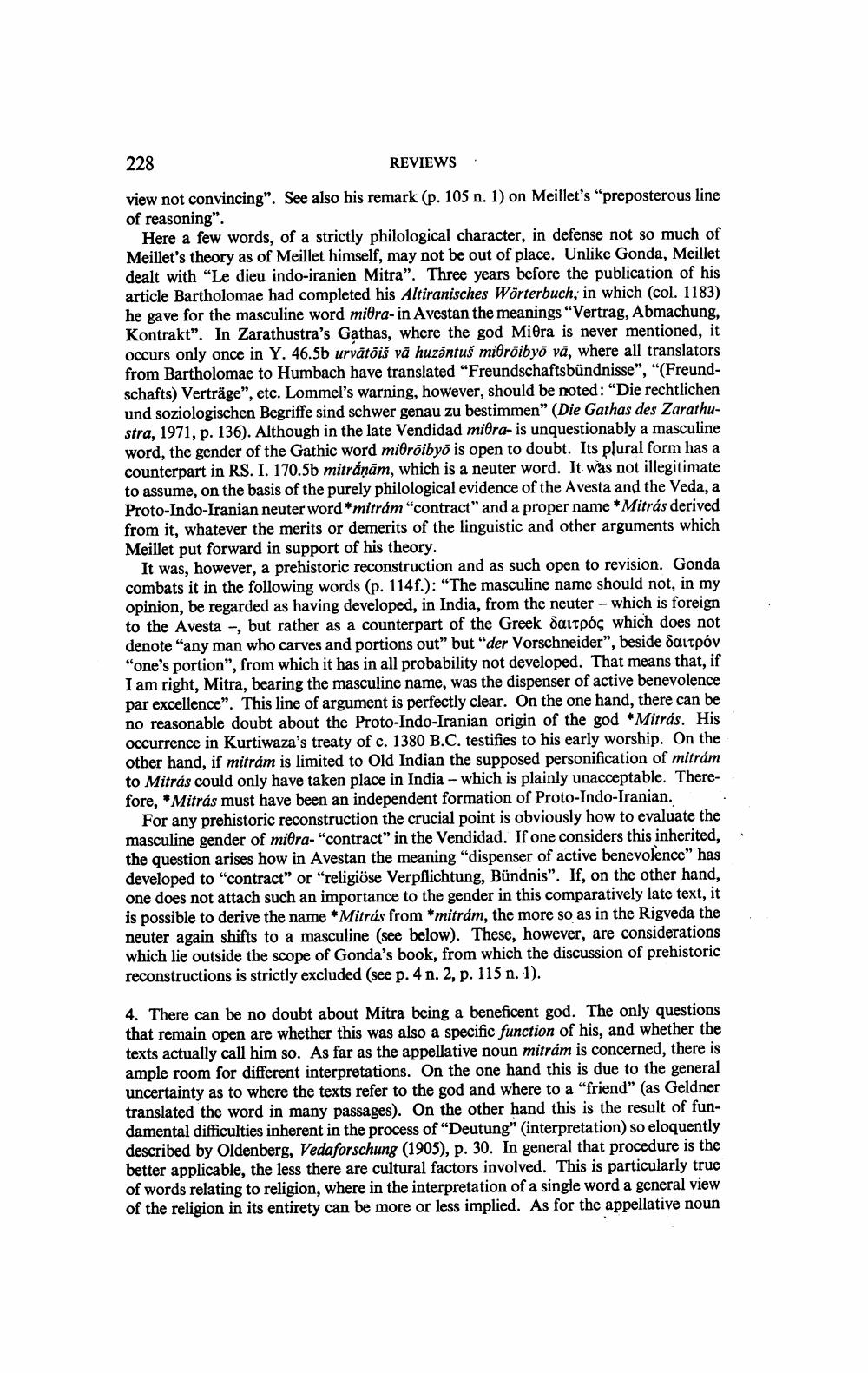________________ 228 REVIEWS : view not convincing". See also his remark (p. 105 n. 1) on Meillet's "preposterous line of reasoning". Here a few words, of a strictly philological character, in defense not so much of Meillet's theory as of Meillet himself, may not be out of place. Unlike Gonda, Meillet dealt with "Le dieu indo-iranien Mitra". Three years before the publication of his article Bartholomae had completed his Altiranisches Worterbuch, in which (col. 1183) he gave for the masculine word midra-in Avestan the meanings "Vertrag, Abmachung, Kontrakt". In Zarathustra's Gathas, where the god Midra is never mentioned, it occurs only once in Y. 46.5b urvatois va huzantus miroibyo va, where all translators from Bartholomae to Humbach have translated "Freundschaftsbundnisse", "(Freundschafts) Vertrage", etc. Lommel's warning, however, should be noted: "Die rechtlichen und soziologischen Begriffe sind schwer genau zu bestimmen" (Die Gathas des Zarathustra, 1971, p. 136). Although in the late Vendidad mira-is unquestionably a masculine word, the gender of the Gathic word mioroibyo is open to doubt. Its plural form has a counterpart in RS. I. 170.5b mitranam, which is a neuter word. It was not illegitimate to assume, on the basis of the purely philological evidence of the Avesta and the Veda, a Proto-Indo-Iranian neuter word * mitram "contract" and a proper name * Mitras derived from it, whatever the merits or demerits of the linguistic and other arguments which Meillet put forward in support of his theory. It was, however, a prehistoric reconstruction and as such open to revision. Gonda combats it in the following words (p. 114f.): "The masculine name should not, in my opinion, be regarded as having developed, in India, from the neuter - which is foreign to the Avesta -, but rather as a counterpart of the Greek daitpos which does not denote "any man who carves and portions out" but "der Vorschneider", beside Saitpov "one's portion", from which it has in all probability not developed. That means that, if I am right, Mitra, bearing the masculine name, was the dispenser of active benevolence par excellence". This line of argument is perfectly clear. On the one hand, there can be no reasonable doubt about the Proto-Indo-Iranian origin of the god *Mitras. His occurrence in Kurtiwaza's treaty of c. 1380 B.C. testifies to his early worship. On the other hand, if mitram is limited to Old Indian the supposed personification of mitram to Mitras could only have taken place in India - which is plainly unacceptable. Therefore, * Mitras must have been an independent formation of Proto-Indo-Iranian. : For any prehistoric reconstruction the crucial point is obviously how to evaluate the masculine gender of midra- "contract" in the Vendidad. If one considers this inherited, the question arises how in Avestan the meaning "dispenser of active benevolence" has developed to "contract" or "religiose Verpflichtung, Bundnis". If, on the other hand, one does not attach such an importance to the gender in this comparatively late text, it is possible to derive the name *Mitras from *mitram, the more so as in the Rigveda the neuter again shifts to a masculine (see below). These, however, are considerations which lie outside the scope of Gonda's book, from which the discussion of prehistoric reconstructions is strictly excluded (see p. 4 n. 2, p. 115 n. 1). 4. There can be no doubt about Mitra being a beneficent god. The only questions that remain open are whether this was also a specific function of his, and whether the texts actually call him so. As far as the appellative noun mitram is concerned, there is ample room for different interpretations. On the one hand this is due to the general uncertainty as to where the texts refer to the god and where to a "friend" (as Geldner translated the word in many passages). On the other hand this is the result of fundamental difficulties inherent in the process of "Deutung" (interpretation) so eloquently described by Oldenberg, Vedaforschung (1905), p. 30. In general that procedure is the better applicable, the less there are cultural factors involved. This is particularly true of words relating to religion, where in the interpretation of a single word a general view of the religion in its entirety can be more or less implied. As for the appellative noun




